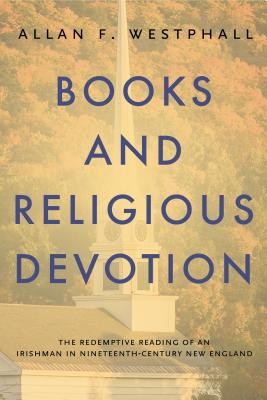
- We will send in 10–14 business days.
- Author: Allan F Westphall
- Publisher: Penn State University Press
- ISBN-10: 0271064056
- ISBN-13: 9780271064055
- Format: 15.2 x 22.9 x 1.4 cm, softcover
- Language: English
- SAVE -10% with code: EXTRA
Reviews
Description
In Books and Religious Devotion, Allan Westphall presents a study of the book-collecting habits and annotation practices of Thomas Connary, an Irish immigrant farmer who lived in New Hampshire in the latter half of the nineteenth century. Connary led a pious life that revolved around the use, annotation, and sharing of religious books. His surviving annotated volumes provide a revealing glimpse into the utility of books for a common reader--and they show how one remarkable, eccentric reader turned religious books into near icons. Through a careful excavation of book adaptations and enhancements, Westphall gives us insight into the range of opportunities provided by the material book for recording and communicating Connary's religious fervor. The study also investigates the broader nineteenth-century cultural setting, in which books are seen as testimonies of personal faith and come to function as instruments of social interaction in both domestic and public spheres. Underlying Connary's many and varied interactions with books is his belief that working in books, as physical objects, can be a devout exercise instrumental in human salvation.
EXTRA 10 % discount with code: EXTRA
The promotion ends in 19d.21:07:12
The discount code is valid when purchasing from 10 €. Discounts do not stack.
- Author: Allan F Westphall
- Publisher: Penn State University Press
- ISBN-10: 0271064056
- ISBN-13: 9780271064055
- Format: 15.2 x 22.9 x 1.4 cm, softcover
- Language: English English
In Books and Religious Devotion, Allan Westphall presents a study of the book-collecting habits and annotation practices of Thomas Connary, an Irish immigrant farmer who lived in New Hampshire in the latter half of the nineteenth century. Connary led a pious life that revolved around the use, annotation, and sharing of religious books. His surviving annotated volumes provide a revealing glimpse into the utility of books for a common reader--and they show how one remarkable, eccentric reader turned religious books into near icons. Through a careful excavation of book adaptations and enhancements, Westphall gives us insight into the range of opportunities provided by the material book for recording and communicating Connary's religious fervor. The study also investigates the broader nineteenth-century cultural setting, in which books are seen as testimonies of personal faith and come to function as instruments of social interaction in both domestic and public spheres. Underlying Connary's many and varied interactions with books is his belief that working in books, as physical objects, can be a devout exercise instrumental in human salvation.


Reviews